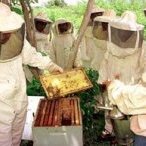
11 August 2011 | Interviews | Forests and biodiversity
Surrounded
Interview with Amado Ferrari, Uruguayan beekeeper
Download: MP3 (1.4 Mb)
CALAPIS is an apicultural cooperative made up by over thirty families located to the North of Uruguay, by the river that gives its name to the country and the border between Uruguay and Argentina.
95 per cent of its production is for export, especially to the European Union, where Germany is the world’s largest importer of honey in the world. While it is not a massive business, beekeeping is an activity appropriate for family production and it plays an extremely important role for the preservation of biodiversity.
However, lately, many families focused on apiculture have been affected by the expansion of the two main monoculture plantations: GM soy and trees. Both expressions of agribusiness take up, each, one million hectares and imply a hard blow for beekeepers, who are experiencing a decreased quality of their honey –due to the reduction of species and therefore the pollen that produce the “raw material” to be processed in the hives- and at the same time, the high production costs, since it is now necessary to travel more and more miles to locate the apiary.
This is what Amado Ferrari, member of CALAPIS and a producer from Paysandu department, 350 km from Montevideo, said to Real World Radio.
The actions by the Uruguayan beekeepers have resulted in a ban to the use of the strong insecticide Fipronil, which was sprayed in forests against ants. Tens of hives were reported to be destroyed by the massive use of this insecticide, which was officially banned, although there are still cases of poisoning by Fipronil.
The Ministry of Livestock, Agriculture and Fisheries propose a regimen of “coexistence” through a georeferential location system of apiaries to inform the companies that carry out the sprayings.
However, the expansion of GM crops has caused new difficulties for the sector, according to a recent report by RAPAL Uruguay. In their July newsletter they state that “German beekeepers have filed a lawsuit at the European Union against importing honey from Uruguay, since it contained GM pollen”, and “Uruguayan honey is no longer considered a natural product, since transgenic traces were found in several samples to be sold in Europe”.
According to this article that quotes different sources “over 20 million dollars were lost this year with the ban of Uruguayan honey in Europe due to the presence of pollen from GM crops”.
Ferrari also said that his organization is trying to improve the quality of life of the bee-keeping families and highlighted the threats that monoculture plantations represent. He also made reference to the reduction of apicultural production in Uruguay, where the rainfall patterns have been severely modified, in addition to the blossoming patterns which are the basis for the production in the beehives.







